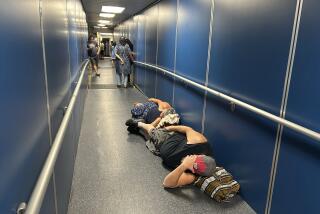Science / Medicine : Crash Causes a Predictable Failure
One thing worse than a bad weather prediction is no prediction at all.
A computer system crash disrupted service at the National Meteorological Center for three days, according to Harlan Saylor, deputy director.
A series of failures caused the center to miss the forecast cycle, and those that followed lagged so far behind schedule that forecasters at local weather service offices were forced to issue their predictions without benefit of the computer-produced prognostications normally issued by the center.
Actually, it was worse because forecasts by the center have become so much more accurate in recent years that local forecasters have come to rely on them. “You really get hooked on this stuff,” Saylor said. “We were fortunate in one sense that the weather conditions over the country were relatively mild for this time of year.”
The problem was not with the two Control Data Corp. supercomputers that do the actual forecast modeling, nor with the Hitachi computer that pre-processes information for the supercomputers. Instead, smaller computers that receive and collate the mass of data transmitted from weather balloons and other sources failed.
By the time that repairs could be made, the steady stream of data upon which the forecast-modeling process is based was hopelessly broken and it took the rest of the weekend to patch things up. As luck would have it, Saylor said, two backup sources of forecast data, an Air Force system in Omaha and a Navy system in Monterey, Calif., also were experiencing computer problems that weekend and could not be used.






